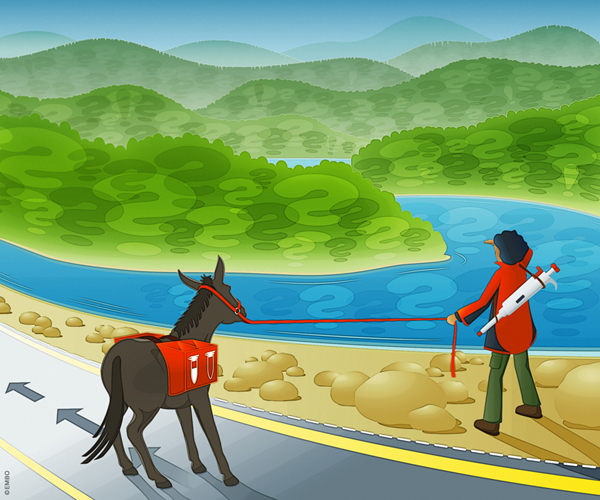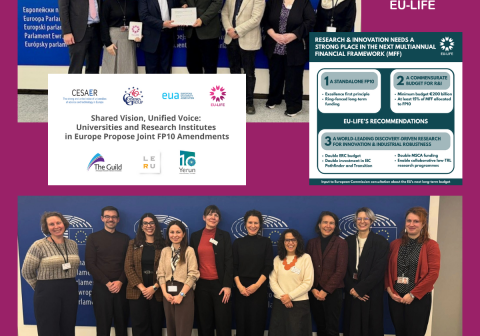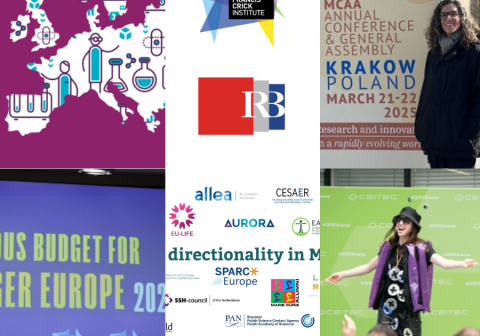Creativity in science: an interview with Katrine Sonne-Hansen
Katrine Sonne-Hansen is Head of Strategic Research Support at Biotech Research and Innovation Centre, University of Copenhagen (BRIC). In the last few years, she has worked with BRIC’s director Anders Lund to nurture creativity in research at BRIC.

In a recent article [1], Markus Baer, Anja Groth, Anders H Lund and yourself argue that creativity is essential for the research process but that over the last decades, scientists have been conditioned to avoid being bold. What moved you to write the article?
We are very curious as to how we can offer the best framework for long-term transformative research at an organisational level. The first idea of nurturing research creativity came from internal discussions of our ambitions for the training of early career researcher (ECR). We wanted to stimulate ECRs to dare – but how could we do that?
Despite a prevalent idea that scientists are creative, we saw a void in actual knowledge on how creative processes and thinking can be exploited in fundamental research.
This made us contact different creativity researchers, to explore the subject. The article came out of one of these explorations with Prof Markus Baer, who is an acknowledged researcher on creativity.
Is it already possible to see negative effects on lack of creativity in science? What would be the far-reaching consequences of ignoring this trend?
Different studies, as mentioned in the article, indicate that the level of novel findings may be decreasing. At the same time, investments in research have been increasing. So it could be said that the way we do research today has less transformative potential compared to the investments made. This of course may have a negative effect on solving large societal challenges, which often need science-based breakthroughs and innovation.
In the article, you directly link creativity in science to high-trust environments and a supportive and inclusive research culture. Is the lack of creativity part of a wider systemic problem?
Evaluations of the work environment and culture are not always good in research organisations. The pressure to publish and the competition for funding are high, and the career prospects are insecure.
It has been shown that creativity best flourishes in organisations where mistakes are seen as part of the work process, where no questions are labelled as stupid and where experiences and knowledge obtained in some areas fertilise other areas.
In our own institute, among group leaders and maybe surprisingly, the central most important prerequisite for research excellence was highlighted to be collegiality and collaboration. So, if we want creativity to flourish, we need to work with the culture in our research organisations. But it is not easy. We once did a huge brainstorming exercise at BRIC, with the goal to engage and exploit better the diverse knowledge in our institute. Both group leaders and early career researchers expressed a wish for forums where new ideas and challenges were explored across the institute. However, when it came down to people volunteering to be first movers to present, no one volunteered. So even though I think we have gone far at BRIC, and our work environment is evaluated as open and trustful, we still have obstacles to overcome for people to feel confident about openly discussing their challenges and doubts.
What do we need from funding agencies and politicians to revert the current tendency? What are the main barriers to be crossed?
First of all, politicians and funders need to understand that fundamental research takes time and cannot always be linked to outcomes and societal impact at an early stage. The societal impact of frontier research may take years to emerge.
As the former CEO of Novo Nordisk Mads Krogsgaard once said, ‘Novo Nordisk has never done a ground breaking discovery’ – their worldwide business builds on fundamental research done over many years at research organisations. So, securing long-term funding for discovery-driven research is absolutely crucial, as well as securing that success measures are not putting incentives on researchers to choose ‘safe’ projects, where they know they can publish with a constant flow. The evaluation models of research and researchers need to move away from the heavy use of metrics, as it creates a competitive performance culture counteracting, especially in early career researchers, to have an open and curious mind.
What can research organisations do to encourage their scientists to apply creative thinking?
As mentioned in the above point, appropriate evaluations and awarding of researchers are crucial within research organisations and leadership should support a trustful and open environment. Also, developing a resonating language around creativity is important. People often see creativity as something related to arts or funny inventions.
But actually, if you look at the steps of the experimental research process, it has huge resemblance to the creative process. Making this understood may encourage scientists to apply creative thinking in a structured way in their research approach.
Creativity is a skill that can be learned - many methods have been developed to promote creativity in ideation as well as in decision making. As an organisation, we have offered training to research leaders and staff to be aware of their creative approach and to be able to use creative methods. This has created an awareness of the potential, but we still have miles to walk in terms of understanding how we as a centre can best support and implement research creativity.
This year, EU-LIFE celebrates its 10th anniversary with different activities aimed at envisioning the research centres of the future, where creativity in science is one of the main topics. What else could umbrella organisations like EU-LIFE do?
The work that EU-LIFE is doing to create awareness of the value of fundamental research and of new approaches in research and researcher evaluation is linked to research creativity. So, continuing that work is crucial. In addition, EU-LIFE could perhaps facilitate a partnership with creativity researchers to build up empirical knowledge of how creative thinking and methods can be exploited in basic research organisations. EU-LIFE did a similar project with social scientists with the aim to implement innovative efforts to achieve gender equality in academia. A project on creativity could generate knowledge on measures that can stimulate and maintain creativity at different levels in research organisations. It takes research to persuade researchers to adopt new approaches!
[1] BAER, Markus, GROTH, Anja, LUND, Anders H., SONNE-HANSEN, Katrine. ‘Creativity as an antidote to research becoming too predictable’. The EMBO Journal (2023) 42: e112835. https://doi.org/10.15252/embj.2022112835



